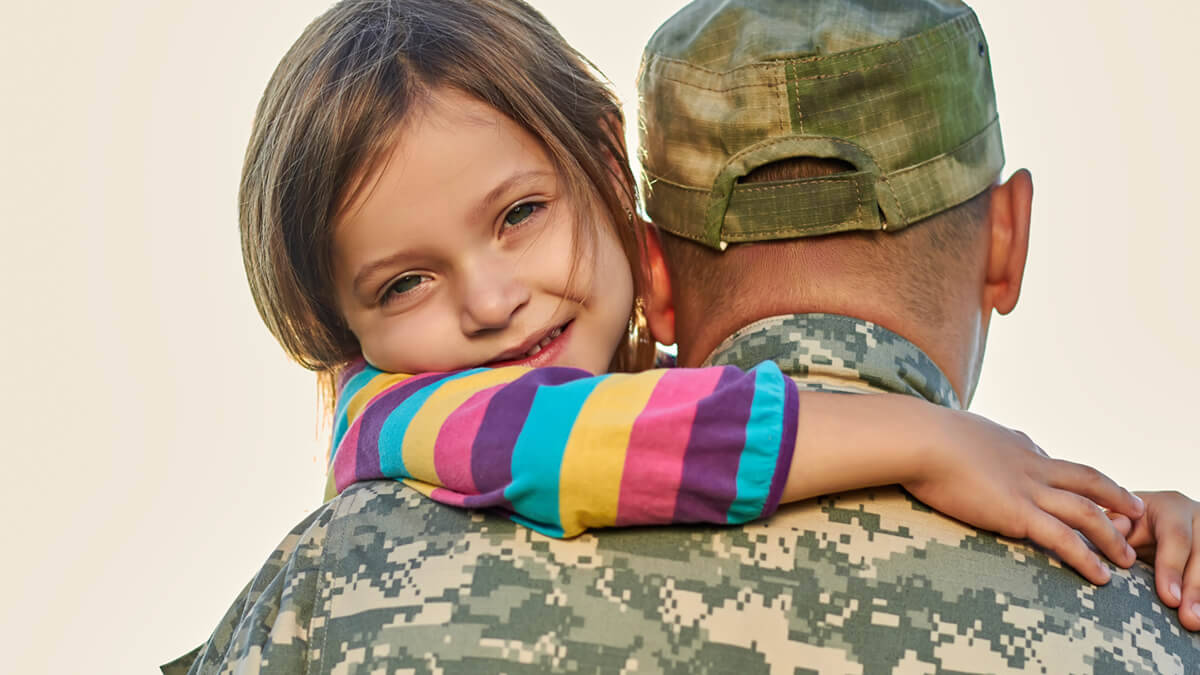
Family Separation
Deployment is difficult not only on those who head overseas, but on the family members who stay at home as well. In particular, children of deployed personnel can experience a number of mental health consequences. Research shows that these kids, as a whole, exhibit increased incidences of depression, suicidal tendencies, anxiety, and behavioral problems.1 To help mitigate these mental health issues, counselors can help them learn resilience and positive coping techniques. While mental health counselors can’t remove the stress of having a loved one overseas, they can help families better handle the experience.
Readjusting After Deployment
Nearly half of all veterans who served in Iraq and/or Afghanistan have reported difficulties readjusting after returning home.2 In particular, many veterans struggle with finding meaning or fulfillment in their daily routine. This can lead to everything from an occasional loss of interest in everyday activities to general apathy and clinical depression. Mental health counselors can help these veterans address the underlying stresses interfering with their readjustment and provide behavioral therapies that can lessen or eliminate the negative feelings. When veterans are discharged from the military, mental health counselors can also provide career counseling to help make the transition into civilian life easier.
Drug and Alcohol Abuse
Military personnel and military family members sometimes turn to drugs and/or alcohol as a way to deal with the mental stress of serving or having a family member serving in the military. Drug and alcohol abuse can lead to familial discord, job loss, or even death. When working with military personnel or members of their family on any issue, mental health counselors often take the time to make sure drugs and alcohol aren’t a problem. If they are, the counselor can help provide treatment.
PTSD
Short for post-traumatic stress disorder, PTSD is one of the most serious mental health issues counselors help combat veterans work through. It can include a number of debilitating symptoms, including flashbacks of the traumatic event; being easily startled or frightened; memory problems; emotional numbness; erratic sleep; and having intense, situationally inappropriate reactions to stimuli (such as noises, scents, etc.) that are reminiscent of the trauma. While some aspects of PTSD may need to be treated with medication, mental health counselors can play a large role in helping combat veterans process traumatic events and regain control of their lives.
Suicidal Ideation
On average, about 20 military veterans commit suicide every day, according to data analysis by the U.S. Department of Veterans Affairs.3 This sobering statistic illustrates the mental health challenges military personnel face, as well as the important role mental health counselors can play.
How Can You Help Military Personnel and Their Families?
If you’re thinking about a career in mental health counseling and would like to focus on military personnel and their families, consider earning an MS in Clinical Mental Health Counseling. Through a clinical mental health master’s program, you can gain the confidence, qualifications, and critical-thinking skills needed to help military clients cope with daily life and overcome their greatest challenges.
If going to a campus to attend classes at specific times is unworkable with your schedule, there are online learning options that can make earning your master’s degree more achievable. Through a clinical mental health counseling online program, you can complete your coursework from home. Plus, an online university provides working adults with the ability to choose a schedule compatible with their numerous responsibilities.
Our military personnel and their families need well-trained mental health counselors to help them handle the unique challenges they face. Thanks to online education, you can earn your MS in Clinical Mental Health Counseling and put yourself in position to provide these much-needed services.
Walden University is an accredited institution offering an MS in Clinical Mental Health Counseling degree program online. Expand your career options and earn your degree using a convenient, flexible learning platform that fits your busy life.
1Source: http://health.usnews.com/health-news/health-wellness/articles/2016-02-18/reducing-mental-health-risk-for-kids-in-military-families
2Source: www.apa.org/about/gr/issues/military/mental-health-needs.pdf
3Source: https://www.va.gov/opa/pressrel/pressrelease.cfm?id=5114
Walden University is accredited by The Higher Learning Commission, www.hlcommission.org.




